



First Female Biochemistry PhD Supports Department

The first woman to receive a PhD in biochemistry from the University of Tennessee, Knoxville, has bequeathed $1,000 to the Department of Biochemistry and Cellular and Molecular Biology.
Noranna Burridge Warner had earned a bachelor’s degree in chemistry at UT in 1968 before continuing her studies in biochemistry under Professor Kenneth Monty, who founded the department just a few years earlier and was its first chair. After earning her doctorate in 1971, she completed medical school at the UT Health Science Center in Memphis in 1975.
Warner served her internship and residency in Memphis. After a post-doctoral fellowship at the Scripps Institute in La Jolla, California, she joined the faculty of the Division of Rheumatology at the University of Texas. Shortly after her retirement, the Dr. Noranna B. Warner Endowed Chair was established at what is now the McGovern Medical School
Warner died after a brief illness in 2023.
By Amy Beth Miller
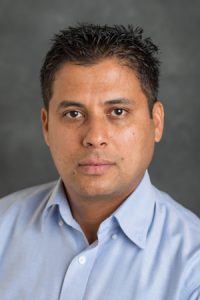
Gifts to BCMB Yield Big Results
BCMB is fortunate to receive gifts from alumni and others that support initiatives such as research and professional development by students, postdoctoral researchers, and faculty.
The Dr. Donald L. Akers Jr. Faculty Enrichment Fellowship supports innovative research, with the goal of generating preliminary data to obtain extramural funding. This fellowship was made possible by a kind gift from Dr. Donald and Judy Akers. Several recent recipients (Brad Binder, 2022; Gladys Alexandre, 2021; Elena Shpak, 2020) used this fellowship to publish new findings and obtain federal grant support.
The David and Becky Eaker Graduate Student Award supports professional development. This award was started by Shannon Eaker (PhD ’01) and his parents. This award had a big impact for Shushu Wei (PhD ’24). “The funds from this award covered expenses related to conferences, which were important for helping me get a position in a research group of my interest,” Wei said. “The award also validated the hard work that I put into my research. I am deeply grateful for the opportunities it has opened.”
Noteworthy Grants, Awards, and Accomplishments
Faculty Updates
Jianbin Wang obtained a National Institutes of Health (NIH) National Institute of General Medical Sciences grant to study programmed DNA elimination. Wang also was awarded the Professional Promise in Research and Creative Achievement Award from the provost.
Keerthi Krishnan was awarded a National Science Foundation grant to study the role of perineuronal nets in rat maternal behavior.
Rachel P. McCord received an NIH R35 Maximizing Investigators’ Research Award (MIRA) to study the folding, misfolding, and unfolding of the human genome in response to stresses and disease.
Fran Barrera became a Standing Member of NIH Macromolecular Structure and Function A (MSFA) study section.
Amit Joshi and Billy Lau received Faculty Research Assistants Funding (FRAF) from the Office of Undergraduate Research.
Billy Lau received a Faculty Research Mentor Award from the UT Office of Undergraduate Research and Fellowships.
Albrecht von Arnim was awarded a grant from NSF to understand proteasomal plasticity in soybean seeds.
Postdoctoral Researcher and Graduate Student Updates
Eric Brenya was selected for the 2024 Plant Scholars Program from the American Society of Plant Biologists supporting exceptional talent to solve 21st century agricultural problems.
Brandon Estrem presented a talk at the Molecular Parasitology Meeting XXXIV at the Molecular Biology Labs at Woods Hole.
Brandon Estrem, Logan Dunn, and Vitoria Norman received Graduate Student Research Awards.
Jennifer Rybak obtained a Graduate Advancement, Training and Education (GATE) fellowship. She also was awarded the Cokkinias/Fite Award and Hollaender Fellowship from the UT Division of Biology.
Ryan Schuck won an Outstanding Poster Award at the Molecular Biophysics of Membranes Biophysical Society meeting in Tahoe, California.
Lauren Walden was awarded a travel grant from the conference organizers to attend the Neutrons in Structural Biology Conference and Workshop in Arlington, Virginia, and presented a poster at the meeting.
Conner Hawkins was awarded a travel grant from the conference organizers to attend the International Retinoids Conference in St. Paul, Minnesota, and presented both a talk and poster.
Victoria Norman received two external awards, a Summer Program in Neuroscience, Excellence and Success (SPINES) Scholar from the University of Chicago Marine Biology Laboratory and a Neuroscience Scholars Program (NSP) Associate award from the Society of Neuroscience.
Congratulations to Bright Amankwaa, Debalina Archaryya, Anwesha Dasgupta, David Lohry, Alex Overholt, Charles (Boomer) Russell, and Shushu Wei on earning doctorates this academic year.
Undergraduate Updates
Joseph Martin (Krishnan Lab) and Abigail West (Wang Lab) presented at Arts & Sciences Undergraduate Research Symposium (ASUReS). Martin received an ASUReS award.
Marro Agbaga (Wang Lab), Marilyn McCarthy (Joshi Lab), and Joseph Martin (Krishnan Lab) won Advanced Undergraduate Research Activity (AURA) Awards from the Division of Student Success.
Alexandra McBryar (Krishnan Lab) was given a 2024 EUReCA Achievement Award from the College of Arts and Sciences as part of the Exhibition of Undergraduate Research and Creative Achievement.
Playter Exploring the 3D Structure of the Genome
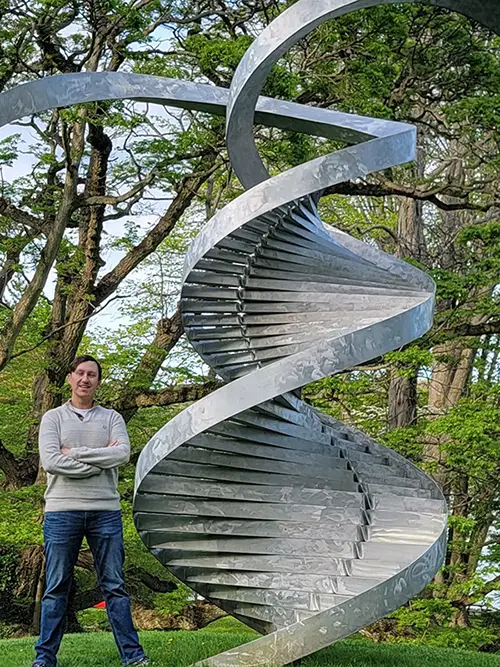
Chris Playter has always been interested in science. Both of his parents are engineers, and in high school he enjoyed science classes the most. “I really became interested in science in my sophomore year as an undergrad at Purdue (University), when I took my first college genetics class and was fascinated by how four bases in very specific orders can make us that much different from something like a banana,” he said. “I changed my major from biology to genetics the following semester and loved everything about it.”
He did not do any undergraduate lab research at Purdue but did spend three summers doing lab research at Stanford University. “It was there that I truly fell in love with research and knew I wanted to make it my career,” Playter said. “After my last summer at Stanford, I got a job in industry to further my research background while I applied to graduate programs.”
He joined the BCMB department as a graduate student in August 2019 and is conducting his doctoral research in the lab of Associate Professor Rachel P. McCord, studying the 3D organization of the genome. “My research is a perfect combination of cancer biology and genetics,” he said. “My first scientific love was genetics, but as I got further into my college courses, I was able to take specific genetic courses, one being the genetics of human cancers. Obviously, cancer is something that everyone is familiar with, but I was always curious how it worked on a genetic level.”
“The most exciting thing about my research is that I am finding something new that no one has seen before,” Playter said. “My focus is on melanoma (skin cancer), and what we have found is that the act of cells squeezing through very small pores, like they do when cancer metastasizes, changes the 3D organization of the genome in those cells. This can help us understand why some tumor cells can metastasize while others cannot. My research can be a stepping stone for other researchers or even clinicians to help patients live longer after a cancer diagnosis.”
Playter finds support for his research department wide. “The department is extremely diverse in research areas ranging from protein biochemistry to plant biology and everything in between,” he said. “The department is extremely friendly, and even professors whose research is nothing like mine have been amazing at helping me think about my project in ways I would have never done on my own.”
When not in the lab, Playter spends time outside at the golf course and playing with his dog. He’s also a big sports fan who enjoys going to UT football and basketball games.
Ward Investigating How Membranes Affect Proteins
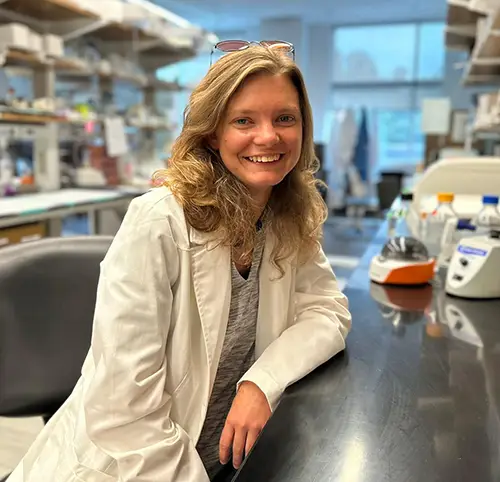
Alyssa Ward’s interest in the natural sciences started early. “Believe it or not, it all started with a milk carton,” she said. “My dad and I were doing our annual father-daughter Christmas breakfast. I ordered chocolate milk with breakfast. When it arrived at the table, I turned the carton around and began asking questions about how the ingredients and chemicals listed under the nutritional information were calculated. Then I asked that simple question—Why? Since then, my fascination and love of the sciences has grown into my career field of choice. From my grade school years to my current graduate studies, I have truly developed an appreciation for the many disciplines of science.”
Her curiosity led her to pursue an Associate of Science degree from Cleveland State Community College, where she started her interest in proteins. A conversation with a former professor led Ward, a first-generation college student, to apply to Maryville College, where she went on to obtain a BS in biology and chemistry. While at Maryville College, Ward interned with Cornerstone Analytical Laboratories to gain hands-on experience with biophysical techniques. She also participated in a research project at Maryville College that led to a senior honors project and research presentations at the Appalachian College Association and Annual Biomedical Conference for Minority Students (ABCMS) meetings.
Many factors influenced Ward’s choice to come to UT for a doctorate, but one stands out. “While attending ABCMS, I met a former UT graduate who explained the academic journey using an analogy: ‘Undergraduate studies are like browsing a bookshelf and deciding on a book to read. Earning a master’s degree is like being able to memorize a few chapters of that book. When one has added a new chapter to the book, you have become a philosopher.’ This analogy alongside my educational experiences shaped my perspective of what type of chapter I wanted to contribute to science,” Ward said. “Keeping this in mind, I joined Associate Professor Francisco Barrera’s lab with the idea that my project could span from identifying structural aspects to overall cellular behavior.”
Her current research is focused on how cholesterol affects protein dimerization and localization in the cell of the ROR receptor tyrosine kinases. “My end goal is to help bridge the gap of our understanding on how external factors govern the activation of ROR1 and ROR2 through dimerization so both current and future therapeutics targeting these receptors can account for these factors to improve their efficacy,” she said.
To keep a good work-life balance, Ward enjoys outdoor activities such as rock climbing and archery. But mainly, she continues to “research” her other lifelong passion, martial arts. “Through the years I have been able to find numerous parallels between martial arts and science,” she said. “With the saying that martial arts are as much a science as an art, and that science is as much an art as it is science. You need both creativity and physical knowledge to understand and learn from them. Both have long-term and short-term aspects, and it is easy to get lost in the details!”
Sun Developing Structural Proteomics
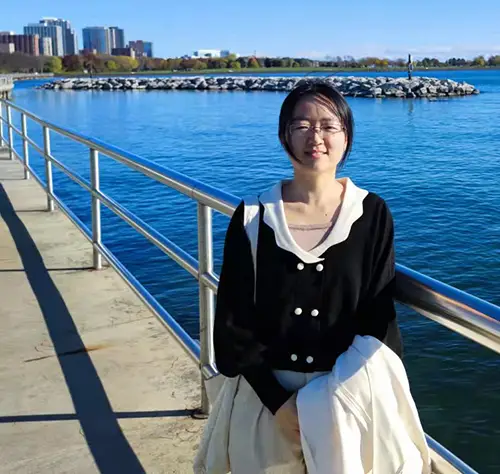
Assistant Professor Jie Sun’s interest in mass spectrometry and structural proteomics began during her undergraduate studies and continued during her PhD studies and postdoctoral research. “The ability of these technologies to unravel intricate biological processes and contribute to advancements in pharmaceutical research fascinated me,” she said. “The prospect of alleviating human suffering caused by diseases through scientific discovery is incredibly rewarding.”
Her research focuses on developing mass spectrometry-based structural proteomics to study higher-order protein structures and functions. The aim of her lab is to understand protein structures, interfaces, solvent accessibility, binding affinities, and folding/unfolding mechanisms. “My lab primarily focuses on membrane proteins, developing novel methods for footprinting these proteins within membrane mimics and eventually in cellular environments,” Sun said. “Our work has significant applications in drug screening and understanding disease mechanisms, including cancer and Alzheimer’s disease.”
One of the key approaches used in her lab is fast photochemical oxidation of proteins (FPOP), where they map proteins by reacting them with hydroxyl radicals generated from hydrogen peroxide by a pulsed laser. This reaction “paints” surface-accessible amino-acid residues, allowing them to study protein-protein interfaces, affinities for small amounts of proteins, drug discovery, and epitope mapping. FPOP is being adopted by biotechnology companies to develop therapeutics.
Sun joined BCMB in August 2024. Students interested in joining the Sun Lab should have a foundation in chemistry, particularly analytical chemistry and biochemistry. “My teaching philosophy emphasizes hands-on learning and critical thinking, preparing students for successful careers in scientific research,” Sun said.
Engelke Investigates Kinesins Within Cilia
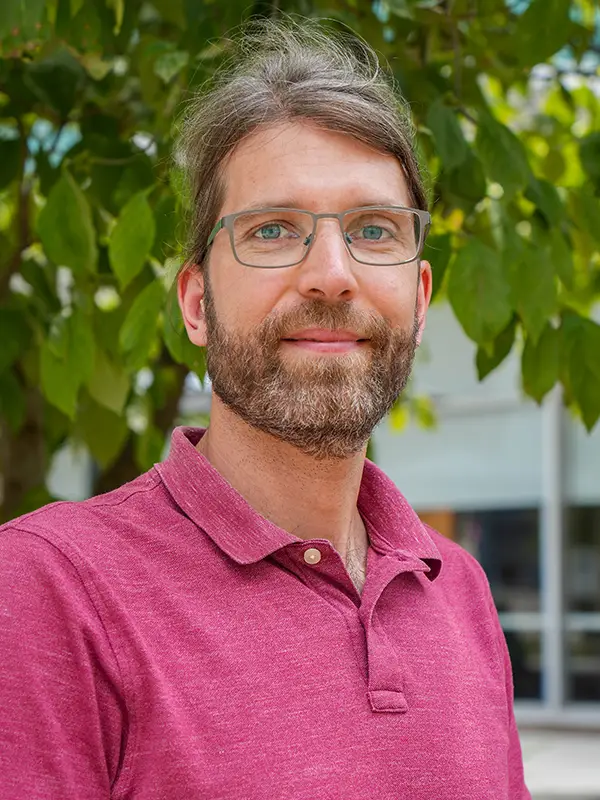
Assistant Professor Martin Engelke became interested in live-imaging of cells and how transport occurs in cells as a graduate student. “During my PhD at the University of Zurich, I performed live-imaging of cells infected with fluorescently-tagged adenovirus,” Engelke said. “The viruses, visible as fluorescent puncta in the cells, moved with complex and seemingly random trajectories through the cytoplasm. Yet, they arrived at the nucleus after similar time periods. This raised questions about what kind of regulation and mechanisms could result in this kind of motion.”
As a postdoctoral researcher at the University of Michigan, he started his interest in motor proteins known as kinesins. When he started his own lab group at Illinois State University, he continued research on kinesins.
Engelke joined the BCMB department in August 2024 and is currently studying the roles of kinesins in transporting molecules within cilia by a process known as intraflagellor transport. Cilia are found on almost all types of animal cells and are important for many functions, such as moving fluid over the surfaces of our airways. When cilia malfunction it can lead to various diseases. His lab is trying to answer various questions about motor proteins and cilia such as: How is the activity of kinesin-2 regulated? Why is continuous intraflagellor transport needed to maintain the ciliary structure? Why do certain kinesin-2 mutants generate longer or shorter cilia?
As a research mentor, he looks for students who are interested in intracellular transport/cilia/cell biology and are motivated to contribute to original research. Engelke believes his role is to “keep their flame of passion for research burning.”
- 1
- 2
- 3
- 4
- Next Page »